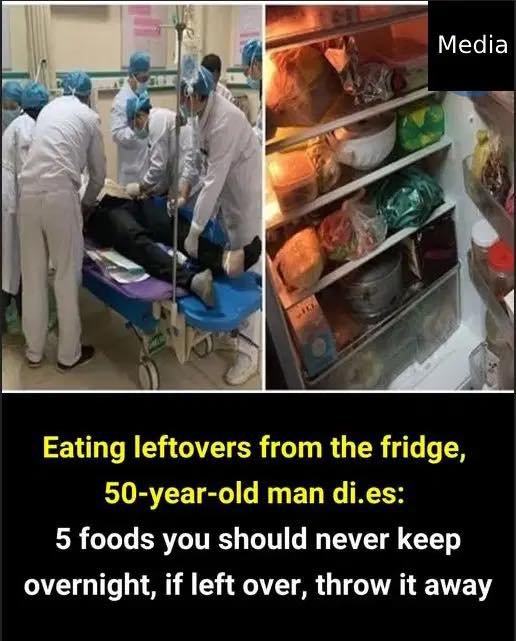As we grow older, our bodies become more sensitive—not just to changes in the weather or medications, but also to the food we eat. What might have been harmless leftovers in our 30s can become risky meals in our 60s and beyond.
That’s why understanding safe food storage for elderly adults isn’t just smart—it’s essential. Some foods can turn dangerous overnight due to bacteria growth, chemical changes, or a rapid drop in nutritional value. While leftovers can be convenient, certain items should never be kept for long, especially for those with weakened immune systems or sensitive stomachs.
Let’s take a closer look at what foods are best eaten fresh, and why keeping them overnight could put your health at serious risk.
Mushrooms and Wood Ear Fungus: A Ticking Time Bomb in Your Fridge
Mushrooms are often praised for their earthy flavor and health benefits, but they’re also surprisingly fragile. The same qualities that make mushrooms nutritious—complex proteins and high nitrate levels—also make them highly unstable once cooked.
Left sitting too long, especially outside the refrigerator or loosely covered, these proteins begin to break down. Nitrates can turn into harmful nitrites, substances linked to digestive issues, headaches, and even long-term health concerns.
Reheating mushrooms that were left out overnight can magnify these effects. For seniors, this could mean an upset stomach—or worse. If you’ve prepared mushrooms or wood ear fungus for dinner, your safest bet is to eat them right away or refrigerate them within two hours, and even then, consume them the next day at the latest.
Spinach and Leafy Greens: Not as Safe as They Look
Spinach, arugula, kale—these vibrant leafy greens are rich in iron, calcium, and essential nutrients. But when left at room temperature or stored improperly, they can become more harmful than helpful.
Spinach is especially high in natural nitrates, which are normally harmless. But given time, heat, and exposure to air, those nitrates can morph into nitrites, which in high amounts can be toxic, particularly to older adults or anyone with heart or kidney concerns.
If you’ve ever packed a spinach salad for lunch and left it on the counter a bit too long, it may be better to toss it. Nutritional loss and chemical changes happen fast in greens. Always refrigerate leafy vegetables promptly and eat within 24 hours to preserve their benefits and avoid risk.
Soy-Based Foods Like Tofu and Soy Milk: High Protein, High Risk
Tofu and soy milk are popular choices for those looking for plant-based protein and dairy alternatives. They’re soft, nourishing, and easy to digest—perfect for many older adults.
But their very makeup—moist and protein-rich—also makes them a breeding ground for bacteria if left unrefrigerated. Of particular concern is Clostridium botulinum, a bacterium that can cause botulism, a rare but potentially fatal illness that attacks the nervous system.
Botulism symptoms can begin with fatigue and blurred vision but may quickly escalate to difficulty breathing or swallowing. This is not a risk worth taking.
If you’ve opened soy milk or cooked tofu, keep it in an airtight container in the refrigerator and use it within 1–2 days. Never leave soy-based products at room temperature, even for a couple of hours.
Soft-Boiled Eggs and Seafood: Protein-Packed but Perilous
Soft-boiled eggs and seafood dishes may seem like comfort food, but they’re among the most sensitive foods when it comes to safe storage. Their high protein and moisture content create an ideal environment for rapid bacterial growth if not refrigerated promptly.
Shellfish like shrimp, mussels, or scallops are especially dangerous. Even if they smell fine the next day, they may contain toxins that can’t be cooked out. These toxins accumulate quickly and can lead to serious foodborne illnesses like vibrio infections, which can be life-threatening to seniors or anyone with a compromised immune system.
Soft-boiled or runny eggs carry the risk of salmonella if not stored and reheated properly. If you’ve made eggs for breakfast and have any leftovers, either refrigerate them immediately or discard them. Reheating soft eggs can also change their texture and make them harder to digest.
What Happens When Food Goes “Bad”?
Spoiled food isn’t always obvious. It might not smell bad, look funny, or taste off. That’s why it’s so dangerous. Bacteria like Listeria, E. coli, and Salmonella thrive in conditions that are common in many kitchens—especially if the food is left out for more than two hours or not stored at the right temperature.
Older adults are at greater risk of serious illness from these bacteria. The immune system becomes less effective with age, making it harder to fight off infections. What starts as a mild stomach ache could lead to hospitalization.
How to Store Leftovers Safely: Tips for Seniors
You don’t have to give up leftovers entirely, but you do need to be extra careful with how you handle them. Follow these simple steps to protect yourself and your loved ones:
- Keep your refrigerator at 4°C (39°F) or below. This slows down bacterial growth.
- Use airtight containers to store leftovers. Avoid foil or open bowls.
- Never leave cooked food at room temperature for more than two hours—even less in hot weather.
- Reheat only once, and ensure the internal temperature reaches at least 165°F.
- When in doubt, throw it out. No meal is worth risking your health.
Your Health Is Worth More Than a Leftover Meal
It’s easy to fall into the habit of saving leftovers, especially when you’re trying to stretch your budget or avoid waste. But when it comes to certain high-risk foods, the cost of saving that extra portion just isn’t worth the risk.
The safest and most nourishing meals are the ones you prepare and enjoy fresh. And if you do have extras, label them, date them, and eat them the very next day—or don’t eat them at all.
Taking these small steps can make a world of difference, especially for older adults. After all, your health and peace of mind matter more than anything sitting in the back of the fridge.



